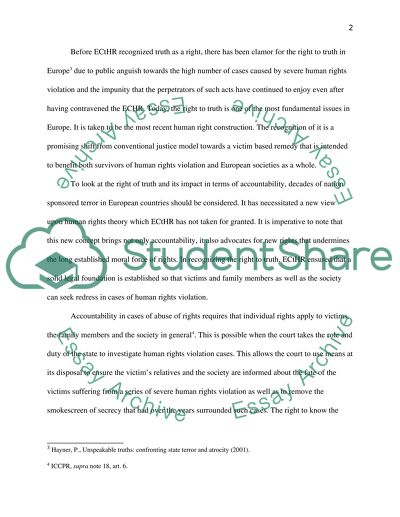Cite this document
(“In 2012, the European Court of Human Rights endorsed the recognition Essay - 1”, n.d.)
In 2012, the European Court of Human Rights endorsed the recognition Essay - 1. Retrieved from https://studentshare.org/law/1673745-in-2012-the-european-court-of-human-rights-endorsed-the-recognition-of-the-right-to-truth-does-this-open-the-way-for-greater-accountability-in-future-cases-of-abuse-critically-discuss
In 2012, the European Court of Human Rights endorsed the recognition Essay - 1. Retrieved from https://studentshare.org/law/1673745-in-2012-the-european-court-of-human-rights-endorsed-the-recognition-of-the-right-to-truth-does-this-open-the-way-for-greater-accountability-in-future-cases-of-abuse-critically-discuss
(In 2012, the European Court of Human Rights Endorsed the Recognition Essay - 1)
In 2012, the European Court of Human Rights Endorsed the Recognition Essay - 1. https://studentshare.org/law/1673745-in-2012-the-european-court-of-human-rights-endorsed-the-recognition-of-the-right-to-truth-does-this-open-the-way-for-greater-accountability-in-future-cases-of-abuse-critically-discuss.
In 2012, the European Court of Human Rights Endorsed the Recognition Essay - 1. https://studentshare.org/law/1673745-in-2012-the-european-court-of-human-rights-endorsed-the-recognition-of-the-right-to-truth-does-this-open-the-way-for-greater-accountability-in-future-cases-of-abuse-critically-discuss.
“In 2012, the European Court of Human Rights Endorsed the Recognition Essay - 1”, n.d. https://studentshare.org/law/1673745-in-2012-the-european-court-of-human-rights-endorsed-the-recognition-of-the-right-to-truth-does-this-open-the-way-for-greater-accountability-in-future-cases-of-abuse-critically-discuss.


